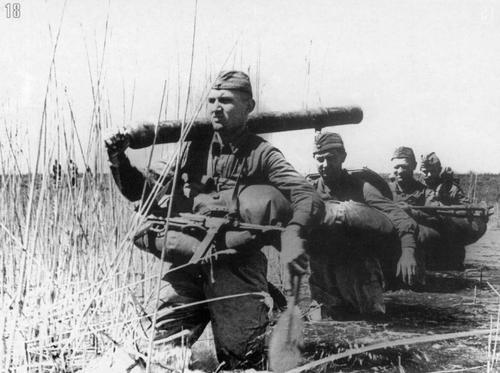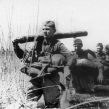
Analyst Examines North Caucasian Attempts To Break Away From The USSR During World War II (Part Two)
Publication: Eurasia Daily Monitor Volume: 8 Issue: 77
By:

Aslan Kazakov’s description of Soviet tactics in the North Caucasus at the dawn of the Soviet era is strongly reminiscent of the modern reality in the region. “[In the 1920’s] officers of the local OGPU (Soviet secret police) department, jointly with detachments of state security services from other regions of the North Caucasus [and] neighboring and central Russian regions, carried out preventative counterintelligence operations,” Kazakov wrote, adding “The OGPU officers took part in police and military operations against insurrectionary activities of the counterrevolutionary elements, often stirred from abroad.”
Today, the boundaries between police and military operations carried out by government forces against the rebels in the North Caucasus are also blurred, just as they were 90 years ago. Tanks, aircraft, artillery and other military equipment are being used to fight the insurgents in the North Caucasus. Police and military forces are recruited from all over Russian Federation to quell the rebellion in this volatile region. “Preventative counterintelligence operations” resemble massive punitive actions against parts of population deemed “unreliable.” The same type of operations, embodying the principle of “collective punishment,” can be seen in the North Caucasus today, as well as constant references to hostile foreign forces with little or no substantiation of these claims.
Widespread disillusionment with the Stalin-run Soviet regime was perhaps the cause of numerous instances of North Caucasian-German collaboration during World War II. Some North Caucasian émigré community leaders, like Gaidar Bammat and Imam Shamil’s grandson, Said-bek, refused to support Nazi Germany. Others, however, hoped to achieve their political goal of creating an independent North Caucasus by helping the Germans. Germany and Turkey were allies at the time and the Germans reportedly actively recruited North Caucasian émigrés and POWs to aid their fight against the USSR. According to Aslan Kazakov, several spy groups sent by the Germans (87 people in all) were destroyed in Kabardino-Balkaria alone during World War II. In another part of the study the author writes about 94 spies who were caught in the republic between 1943 and 1944. Kabardino-Balkaria fell under the control of German troops, but when it was won back by the Soviets, 157 additional “bandits” were reportedly captured by the Soviet security services.
Kazakov describes several Soviet spies from Kabardino-Balkaria, nicknamed with single capital letters, who managed to infiltrate the German security services and establish extensive contacts with the North Caucasian diaspora. The spies reportedly uncovered dozens of “traitors” who worked for the German spy agencies and helped the Soviets eliminate the spy rings in the USSR. Kazakov intermittently emphasizes that after the war many North Caucasian émigrés switched sides to serve the British and American governments, even though he mentions in passing that the British handed over many of the émigrés to the USSR after the war was over.
Even at the height of the war, ethnic conflicts in the North Caucasus apparently did not fully subside. Kazakov tells an amazing story of ethnic Karachays well-positioned in the German military establishment who tried to proclaim an “independent Karachay state” in 1943. The head of the Karachay-populated area occupied by the Germans, Kadi Bairamukov, and the mayor of Kislovodsk (a resort town now part of Stavropol region), Majir Kochkarov, allegedly visited Berlin and tried to lobby the German ministry for the East to establish an independent Karachay state, to include Balkaria and with Kislovodsk as its capital. The Karachay activists even held a plebiscite in the territories that were set to become part of the new state. After some consideration, the German occupation command decided to postpone the decision since the war was still not over. The desire to dissolve Kabardino-Balkaria and Karachaevo-Cherkessia in order to establish ethnically-related territorial units made up of Kabardins and Cherkess, on one side, and Balkars and Karachays, on the other, have persisted ever since, erupting into several political crises in both republics during the past two decades.
It is hard to verify the truthfulness of this story. However, it is very likely that Soviet officialdom perceived the Karachays as a whole as trying to break away from the Soviet Union as soon as the Germans came to the North Caucasus. In addition, the group of Zankishiev, Zhangurazov and Tabaksoev, propped up by the Germans, reportedly managed to capture Kabardino-Balkaria’s Cherek district prior to the Germans’ takeover of the area. This probably partly explains why Stalin deported the closely related Karachays and Balkars en masse to remote areas of Kazakhstan and Kyrgyzstan by the end of 1943 and the beginning of 1944, respectively. The Karachays became the first people in the USSR sent into mass exile. At the same time, according to Kazakov’s study, many other North Caucasian peoples, if not all, collaborated with the Germans in one way or another, but not all of them were the target of Stalin’s wrath.
In particular, the author provides revealing data about eight groups of commandos presumably airlifted by the German military into Checheno-Ingushetia during the war. The groups included 13 Chechens, 16 Ingush, 21 Ossetians, 15 Germans, five Dagestanis, three Kabardins (aka Circassians), two Georgians, one ethnic Russian and a Kazakh. Ossetians, traditionally thought of as particularly loyal to Russia, were apparently willing to fight the Soviet army just as the other North Caucasian émigré groups. Furthermore, in the list provided of hostile émigré activists, Ossetians by far outnumbered Chechens and Ingush put together. Despite that, Stalin sent the Chechens and Ingush into exile in 1944, but did not touch the Ossetians.
Sultan-Girei Klych, a Circassian from Adygea and former Russian imperial army general, tried to organize the Circassians into a “voluntary army” with German support to fight the Soviet army. Reportedly, Klych’s mission largely failed because he was unable to establish “a Circassian army” even though he promised self-government for the Circassians.




